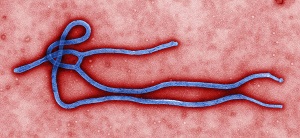 |
| Ebolavirus under an electron microscope--Courtesy of CDC |
Over the last few years, there has been a surge of research to understand Ebola and develop medicines to stop it. And now researchers at Vanderbilt and the University of Texas have isolated antibodies from Ebola survivors which they say can neutralize multiple species of the virus.
The ebolavirus has claimed the lives of more than 11,000 people in West Africa in the past two years and although some countries are marking the end of the recent Ebola epidemic--the World Health Organization (WHO) also warns about the potential reemergence of the virus in 2016.
The new research work was published in the journal Cell, led by James Crowe on the Vanderbilt side while Alexander Bukreyev headed up the University of Texas team.
Monoclonal antibodies are the product of a clone from a type of white blood cell, scaled quickly by fusing it to a cancer cell to grow it in relevant amounts for clinical use. The researchers isolated these from Ebola patients that have resisted the virus.
"In this study, a remarkably diverse array of virus-specific antibodies was isolated, which appeared to bind to various parts of the envelope protein of the virus," said Bukreyev.
Using these monoclonal antibodies may prove an effective way to provide short-term protection to healthcare workers and those that are at risk of being exposed to the virus. They may also be used as antiviral drugs to treat patients who are already infected with the ebolavirus.
Commenting on previous research which has developed and re-engineered mouse antibodies which has limitations, Crowe said: "This work points the way to using fully human antibodies as the next generation of antibody therapeutics
"From the human antibody work … and the vaccine work that's being done, it's clear we can find a protective strategy for Ebola," he said. "That's a big step forward."
- here's the release
- here's the Cell abstract